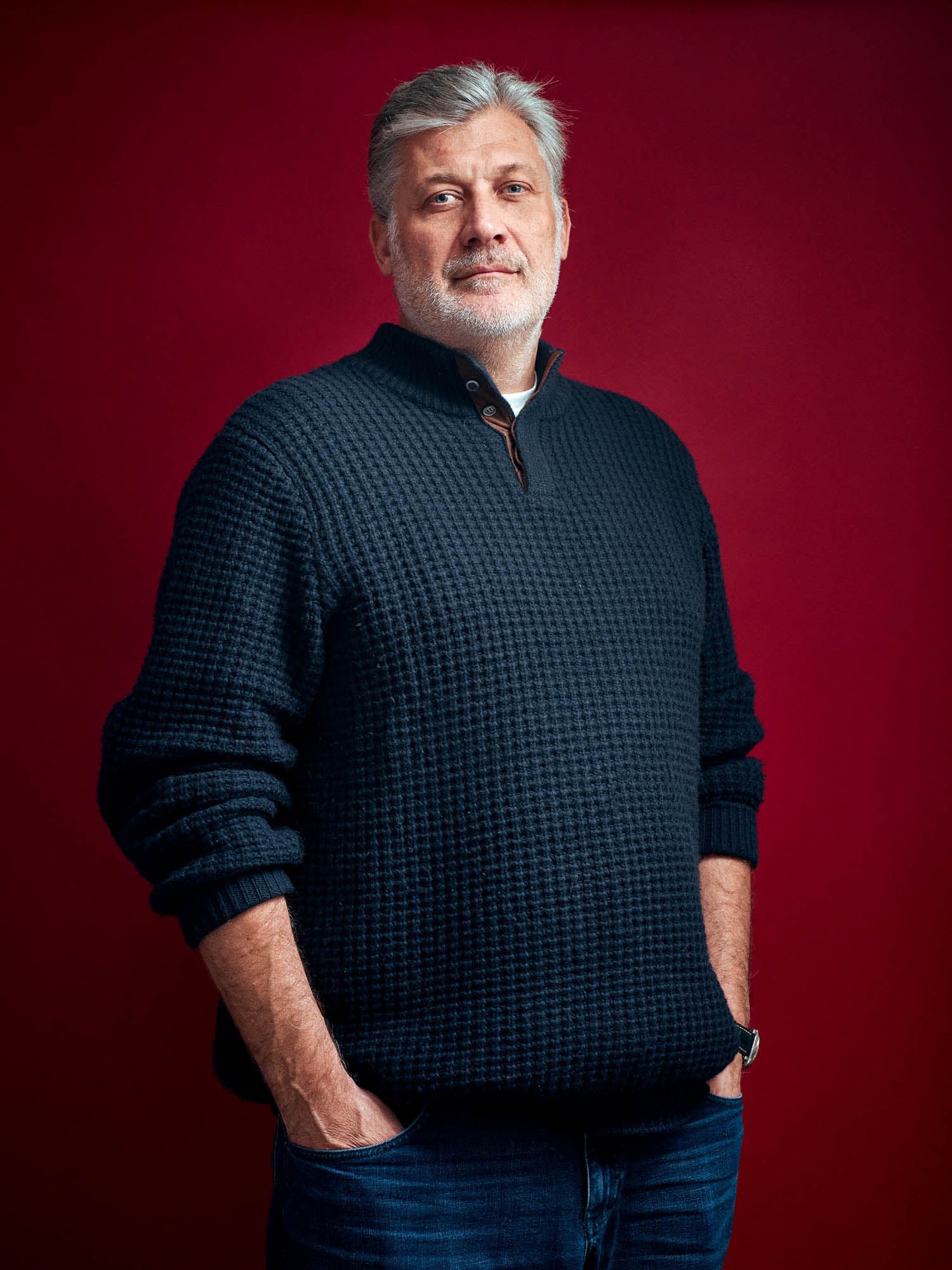How one philanthropist is using neuroscience to battle the cult of the entrepreneur
Nothing is more revered than a self-employed, self-made individual. But it is not all 5am-rising, go-getting, carpe diem-ing and being money-making machines, Martin Friel finds

Much is made of the power of the entrepreneur. The risk-taker, relentless in their drive to build, grow and profit from enterprise. Our culture has elevated them to the position of an all-knowing business guru, an individual born with something more than the mere mortals who toil away under the yoke of PAYE.
You’ll find these individuals polluting your LinkedIn feed with their humble-brag tales of wealth creation, clawing to out-entrepreneur each other on The Apprentice and being lauded as demi-gods on Dragons’ Den.
But what if this perception of the entrepreneur was a false one, an image created by individuals who want us to believe that they are special, that there is something unique about them. What if it was all just a clever self-marketing ploy?
One man who recognises this cult and its deceptive nature is Stefan Allesch-Taylor, CBE.
Allesch-Taylor has cofounded or invested in more than 50 companies worldwide, is the producer of more than 50 short films, a keen philanthropist and a professor in entrepreneurship. It’s safe to say he knows what he is talking about when it comes to the world of the entrepreneur.
“There is a difference between the entrepreneur and the wantrepreneur. Those who create a business and those who want to join the club,” he says.
“The cult of the entrepreneur makes me laugh and I am dismayed at it because it’s not real. It’s the super-cool thing to do but people who are serious about it recognise it is the toughest, most unforgiving, brutal job in the world.”
It wasn’t always the super-cool thing to do. There was a time, Allesch-Taylor remembers, when identifying as an entrepreneur was as good as admitting you were a dodgy geezer, an Arthur Daley or Del Boy.
But there has been a shift towards self-employment since those two were household names, and it seems to have influenced how we perceive the entrepreneur. There are nearly 5 million self-employed people in the UK today, representing 15 per cent of the workforce, a record high. In the last year alone, nearly 200,000 people have elected to work for themselves.
That movement towards self-employment has led to a shift in the perception of what it means to go it alone, to be an entrepreneur. However, Allesch-Taylor believes there is too much emphasis on the glory rather than the reality, and that this approach, more often than not, leads to failure rather than success.
At the moment it is too linked to invention and not enough to the cold steel of application. You are looking at a lot of emperor’s clothes here
“What many people do is definitely entrepreneurial but too many are too engaged in one side of the story,” he says.
“At the moment it is too linked to invention and not enough to the cold steel of application. You are looking at a lot of emperor’s clothes here. Uber’s flotation was a disaster, same with Lyft, and you’ve got situations where fundamentally good ideas have been derailed because of over-expectation of value and the speed they are going to get there.”
He argues that entrepreneurs need to stop seeing themselves as something special or unique and that the drive and determination so many cite as the key to their success is not unique to them. It is, he says, evident in countless working lives up and down the country.
“I object to entrepreneurs hijacking something that everyone has to do at some point in their life. There are geography teachers that have to get up and battle on every day. The idea that entrepreneurs keep going no matter what – that is not their exclusive remit,” he says.

He believes the qualities that often define the entrepreneurial personality can be found and applied across the business landscape: “It’s a mindset that should be applied to all sorts of management. If you have the thinking and training, you can deploy it anywhere as it’s about understanding risk and reward wherever you are running a budget.”
And Allesch-Taylor is taking steps to prove his theory. In 2016, he accepted a role as professor of the practice of entrepreneurship for the Entrepreneurship Institute at King’s College London.
His role is to support King’s entrepreneurs in bringing successful business ideas to market and help them avoid making “the seriously stupid mistakes I made”. But he has taken his theories about the teachability of entrepreneurialism a step further and into the realms of neuroscience.
He is funding a collaboration between the Entrepreneur Institute and the college’s Institute of Psychiatry to understand how an entrepreneur’s brain works and whether the consequent behaviour can be taught to others.
“My instinct is that of course it can. If you can teach someone to dodge bullets in a warzone without losing their mind, you can teach entrepreneurship.
“Fundamentally, it is the assessment of risk versus reward and how that is executed practically in an environment involving money.”
And the psychology involved in assessing risk and reward plays out in his own business dealings. Allesch-Taylor has been or is actively involved in a dizzying range of sectors including hospitality, industrial, agriculture, retail, technology, sports and financial services. Which suggest an almost hyperactive, disordered approach to business.
“I am and have been entirely opportunistic based on what I believed at the time to be the right ingredients for those businesses to do well on a macroeconomic basis,” he says.
“If I’m honest, it’s almost down to a personal confidence level. If I am feeling that I am on top of my brief, I will engage in something really ambitious. If I’ve taken a [financial] hit and my confidence has taken a hit, I’ll move for something more cautious and perhaps less profitable but surer.”
It’s quite comforting to find that entrepreneurs are as vulnerable to fluctuations in confidence as the rest of us mortals, which might explain why Allesch-Taylor has such an issue with the manufactured personality of entrepreneurs as 5am-rising, go-getting, carpe diem-ing, impervious money-making machines.
He suspects that what is missing from many of these would-be entrepreneurs is a desire to create something of substance.
The pursuit of money is not enough to go through what you have to, compared to something that has a higher ideal
“The pursuit of money is not enough to go through what you have to, compared to something that has a higher ideal,” he says, describing starting a business as a horrible job but a wonderful life. “In terms of the highs and lows, you know you’re alive.”
That need to feel alive started at an early age for Allesch-Taylor but was he born with the entrepreneurial spirit, or was it a learning process, as he hopes to prove it can be?
“I was always interested in business, even as a kid, and it was about leadership for me. I liked the idea of leading. Some people are uncomfortable with it, some don’t want it, some want it too much and some want to do it because they can get the best out of themselves and others,” he says.
He has made a transition over the years from a young man who “believed his own bullshit” to a wiser man who understands the importance of surrounding himself with smarter people to get a better result.

“If I look around the room and I am the smartest there, I am in trouble. It usually means you are delusional.
“The great thing about living in London is no matter how rich, great or brilliant you are, there is always someone better than you five feet away. It keeps you measured about your own ability. There are plenty of people out there who know a lot more than you do, and it’s about harnessing that,” he says.
There is, however, a difference between harnessing the skills of others to create something together and relying too much on someone else’s support. In this respect, he is very much the typical entrepreneur in that he believes in standing on one’s own two feet.
“Many people just don’t feel the need to do their job description. It is staggering to me that they don’t feel the need to do what they are hired to do. If you want me to do your job for you, then we are not going to get on.”
And on that note, he doesn’t believe that governments, despite their oft-repeated support for small business, are doing their job by following through on the rhetoric.
“I am profoundly of the view that governments hate SMEs. Why? If you take a look at the rate system, it looks like it is designed to destroy rather than to build. And if you look at most government policies around business, they are out of date at best and unhelpful at worst.
“Whilst governments opine how important SMEs are, they do very little at all to help at a time when we need those businesses the most. As we move into Brexit, SMEs will probably be hit the hardest and they need to be protected the most because of their statistical impact on our day-to-day economy and lives,” he says.
Ah, the B-word. The subject that most people want to talk least about these days, but it would be remiss not to go there with someone who probably knows more than most about what is likely to make businesses tick or fall silent.
“I have no idea if it is a good or bad thing,” he says.
“Which is why I think we probably shouldn’t have gone the route we went. Everyone has concluded that we don’t know what is going to happen and that is not understanding risk and reward.
“As a Yorkshireman, I would say, ‘When in doubt, do nowt’.”
It’s this practical approach to business and specifically entrepreneurialism that makes Allesch-Taylor stand out from his peers. He is no doubt a wealthy man with huge amounts of energy and business acumen but that is where the comparisons with the public persona of the entrepreneur end.
“I like the view that we have one life and one block of time and making the most of it seems to make sense,” he says.
“But I’m not necessarily someone who is always looking for the next challenge – I’m not relentless. I’m quite happy to go fishing.”
Join our commenting forum
Join thought-provoking conversations, follow other Independent readers and see their replies
Comments
Bookmark popover
Removed from bookmarks